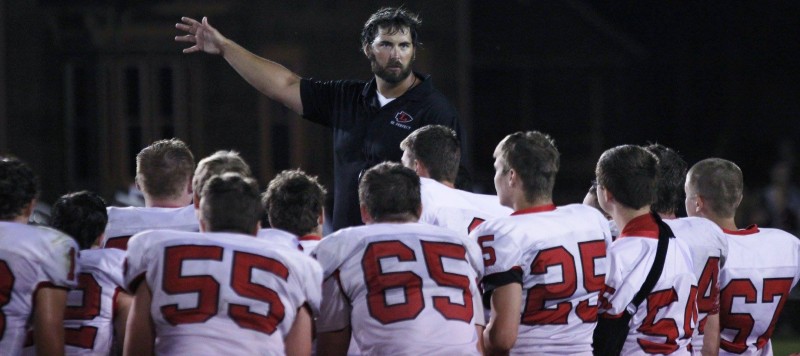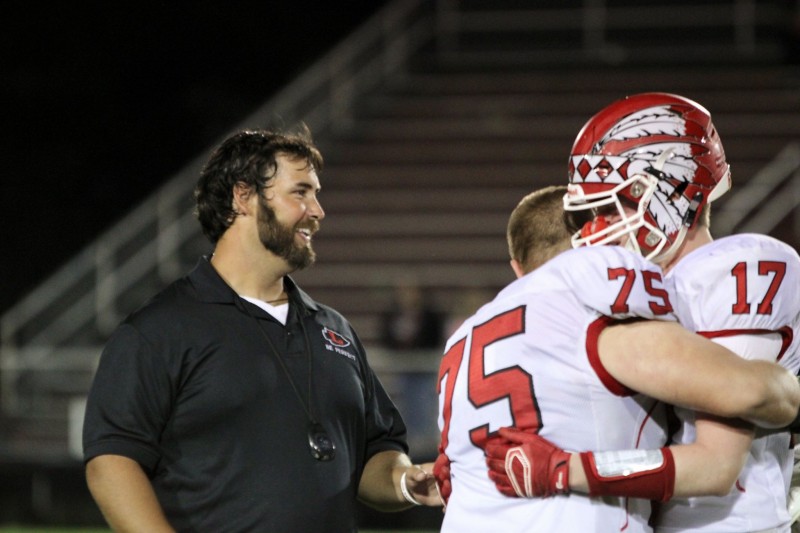
As coaches, we aren't coaching sets and reps. We're coaching Johnny's and Joe's. Not everyone on the team is going to like us, and that's okay and to be expected. Most staffs have several people working with large teams, so if one can't reach the person, the other one can.
There are some athletes that are still hard to reach, though. And maybe no one on the staff has been able to do it. How can we attempt to do it? Well, here are some ways that I have found to do it over the course of my career. Are they perfect and are these the only things you can do to reach the outlier? Hell no. But they worked for me.
RELATED: How To Get Your Athletes to Buy In
There is an old adage that the athletes don't care how much you know until they know how much you care. This became an old adage because it is true. Many athletes we deal with have trust issues. How many come from good home situations? How many come from situations where they were abused, or went hungry, or were in other bad situations? These athletes are not going to trust you because they don't trust anyone. It's not personal; it's how they learned to survive. You have to earn their trust.
What is one of the quickest ways to earn their trust? By getting to know them. Sit down with them. Talk with them. Ask them serious questions and listen — really listen. Be open and vulnerable with them, too. The street doesn't go just one way in this instance. I would not hesitate to share my background with them when I felt it was needed (as you can read from my Live, Learn, and Pass On article), and they would see the similarity. I had been there too. I understood. I let myself be vulnerable with them and they would usually then open up to me. I used to joke with some of them that the only difference between the hood and the backwoods were the types of drugs (meth vs cocaine) being slung, the size of the buildings, and the fact that we had outhouses (that usually gets a laugh when they find out what an outhouse is).
Along that topic, a mentor of mine who was on my doctoral committee as well as being our track coach for 26 years and one of the integral members in starting sports psychology for USATF and the USOC, Dr. Rick McGuire would often tell us his approach during class. He often said, "I have coached more athletes playing cards on the bus than I ever have on the track." While that might sound counterintuitive, this is where he reached them. He developed relationships with them during this time. If you ever witnessed a former athlete seeing coach McGuire for the first time in a long time, it was sort of awe striking. Their voice changed, some would get teary eyed, and nearly all gave him a hug. What was more important to him was evident: he cared about the development of the person more than the development of speed. I will tell you that this may not work in all areas, but you can take a form of his approach to any venue.
I remember one athlete I had a very hard time reaching. I was given him to work with one-on-one and absolutely hated it. I tried everything I could think of with the kid. I tried positive reinforcement, negative reinforcement, coaching sandwich, autonomy, humor, vulnerability— everything. I got frustrated.
RECENT: How Good Is Your Huddle?
Finally, he and I went and sat down in the corner of the weight room and I said, "Hey man, I need your help. I want you to be the best you can possibly be. You've got talent. I have tried everything I know to work with you, to motivate you, and it hasn't worked. What can I do? What is the best way to coach you? How can I motivate you to work and reach your potential?"
The kid was dumbstruck. He looked at me and stumbled around with his words for a minute. Then he looked at me and said, "Coach, this one is on me. You keep doing what you're doing and it's on me to get it right. I just am not always easy to deal with and I know that."
From that moment on, I won't say the kid was perfect but he was tremendously better. He worked with me and I worked with him. I helped him and I put a foot up his ass and both worked. Why? In that moment he saw that I truly cared and was frustrated and wasn't afraid to ask for his input in his development. We bonded over the course of his career and still have a good relationship to this day. To be honest with you, I thought I was going to have to punt with this kid and find someone else to get the job done. I'm glad I didn't, because I got to watch and have a hand in him growing up and becoming a man. Shoot, now he helps me out with some fatherhood/child raising advice.
Sometimes, for no fault of your own, or maybe there was some fault at an earlier time, the athlete doesn't want anything to do with you or anyone else. To try and help with this athlete, I call it the human rope. They won't talk with you, they won't share with you. Who do they share with? Who do they work with? Their teammates and friends. Often times they won't even work with the entire team and it's only a small select group. One of the best ways to work with these kids is to not work with them or approach them in any way. Whatever you do will drive them farther in the opposite direction just because.
You reach out to those that they are close to. You work with them for them to reach the other kid. Maybe it is the case that this kid is always skipping exercises, sets, and reps in the weight room. One of the things you can do is to talk to one of their friends to try and start working out with them. Ask them to not be abrasive with them, but to help them along. Sure, if some technique issues are going on you should hop in and help out; if there is a safety issue you should step in, but for the most part you leave them with who they're close to and who you are close to and trust. A lot of times they will eventually start liking things and maybe even you. And if they don't, it's okay. Chances are at least they're training hard and making improvements in the weight room and the playing field. That's the main point.
There are other times when the athletes won't even want to train with their friends. What do you do then? Well, you do what you can and count small victories. With these kids I use what's called a human safety net. Most of the time, something is going on in their personal lives and they need help. They're not going to listen to me because I'm a coach of a different generation and they feel they can't trust me. What I have done in the past is talk to who they talk to and try and find out what's going on with them. If there is something serious then I will work to set up some help and go to their friends to talk to them about the resources and hopefully they can get them to utilize them.
What resources do I mean? Well, we noticed one athlete seemed to be having a major issue with depression. They wouldn't talk to me or any other coach, so we found a counselor who was willing to work with them and went through their friends to get them to talk the person into going and seeing the counselor. Thankfully they did go see the counselor and turned a corner and ended up becoming a great person.
As a coach, it is super easy to punt and just not worry about these kids who are staying on the outside. It takes time and effort to try and reach these kids. It is also possible that you miss them, and several of them in a row and that gets frustrating. However, sometimes you do reach one and sometimes you were the one who made all of the difference in their life. It's not easy but if you can make a difference for even just one of these kids, it is well worth it.
Images courtesy of Chris Whitacre













1 Comment